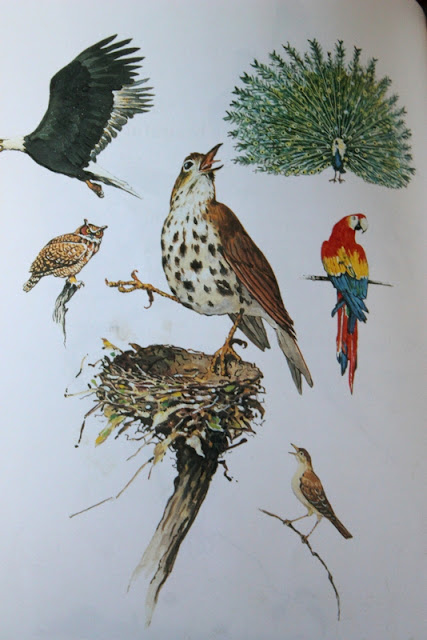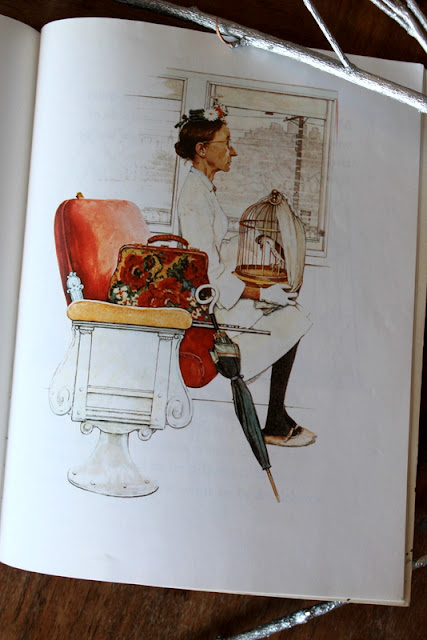I stumbled across this book somewhere last year. This is the one and only kid's book Norman Rockwell ever wrote. According to the note in the front of the book, this story is somewhat autobiographical. How autobiographical is up for debate amongst his friends and researchers.
Willie was born to a normal wood thrush family--A slightly proud and pompous father, a loving mother, and two rambunctious older brothers.
Willie was different.
His father gave daily lectures on the importantance of being a proper wood thrush. Although they are not as mighty, wise, beautiful, or clever as some other birds, wood thrushes are vitally important because of their song that has inspired numerous composers.
"Willie was proud of being a wood thrush. But he also wanted to be himself. He was tired of his father's daily lectures and of trying to be like every other wood thrush. Finally he just couldn't stand it anymore."
So he flies off.
Willie sounds like a typical teenager.
One evening in his new wood, he hears the notes of a flute. Following the sound, he lands on a branch outside the town librarian's window. Miss Polly just happened to be playing a song by Handel that features the thrush song. A delighted Willie sings along. And then he begins to improvise and sing all the song, not just the wood thrush part.
Miss Polly is equally delighted. They play together until twilight.
The next day, Miss Polly goes out for some note taking on Willie. She brings her notes and findings to the local bird club.
They in turn relay her findings to the top ornithological officials in Washington. These experts motorcade to Miss Polly's house to see Willie in action.
All the experts taking a peek at Willie.
All of these faces are based on the actual top ornithological experts of Rockwell's time.
This picture is pure Rockwell.
Willie was unconcerned by this scrutiny. In fact, he sang better than ever.
He sang so well, the experts insisted he was too important to be left in the wild. "All the world deserved a chance to hear and see this remarkable creature." Miss Polly "feels a responsibility to Willie's genius," so she treks down to Washington with him in a cage.
He is placed in a large aviary in Washington.
There is no quiet and Willie is miserable. Even when Miss Polly comes along with her flute, he is too miserable to sing.
"Willie was proud to be different, to be a genius, but he did not want to be a celebrity."
In a few days, Miss Polly puts her foot down. Her sweet Willie needed to return to his own wood. After a few days of recuperation, he rejoins Miss Polly in evening music--just for their own enjoyment.
But in Washington, a room was built to Willie's honor. And if you have the right spirit, amidst all the hustle and bustle of Washington, you can still find Willie's room.
Since this is autobiographical, it is pretty easy to assume that Rockwell wasn't a huge fan of the celebrity that went with his artistic success. Some people argue that Miss Polly was based on his third wife--maybe she helped him to return to his "wood" away from all the trappings of a famous life.
This is a good book about being different, even being proud to be different. It is also a book about the loyalty and understanding between good friends.















I LOVE Norman Rockwell. I remember being in one of my art history classes at Canton and announcing that I loved Rockwell. Oh my, the professor was NOT in agreement with me!!!
ReplyDeleteI love Norman Rockwell too! Apparently he is too easily understood to be appreciated by art critics. ;-)
ReplyDelete